Exporting Data from a Safran Project Database
As with import, Safran Project supports several formats for exchanging project and schedule information. The project Export Wizard allows you to export Safran Project data to the following file types:
- Safran Project/Planner v20.x (*.SPX)
- Safran Project/Planner v7.x (*.SPX)
- Microsoft Project XML (*.XML)
- Primavera (*.XER)
The project Export function provides a wizard-type interface with relevant options and features for the selected format.
Exporting to Safran Project Formats
Safran Project lets you export project and associated data to be read by other Safran Project and Safran Planner installations. The format for this is the Safran Project text file format *.SPX. Both Safran Project and Safran Planner can read this format.
During the export process, you can determine what schedule data elements you want to include, e.g., activities, resources, and resource availabilities.
The export always includes the user-defined data associated with the project, such as calendar sets and calendar definitions, resource sets, profile sets, etc.
You can also apply a filter to export only parts of your Schedule.
When exporting to Safran Project, you can send baseline and status data. However, this would not be relevant when exporting to Safran Planner as it does not support this data type.
The export function may be found on the File/Interface ribbon or by pressing CTRL+E.

Choose the relevant file type for the Safran version you will be exporting to, either Safran Project for current Safran or v22.x for legacy version, and press Next to continue.
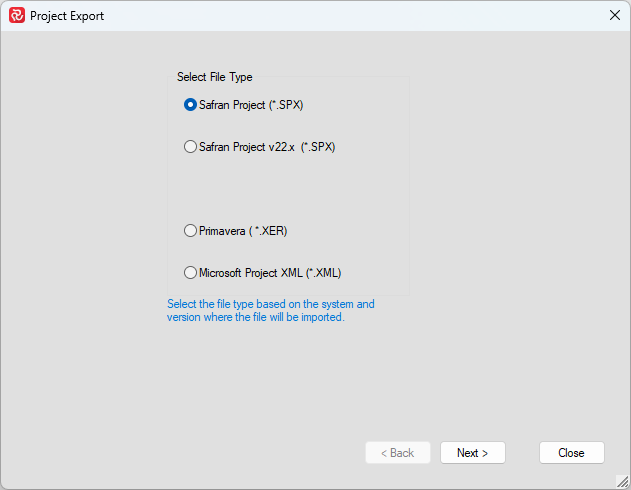
By default, Safran will highlight the project you currently have open. However, you may export any other projects by focusing on the relevant project in the Project list.
Press the Browse button to select a location and specify a file name.
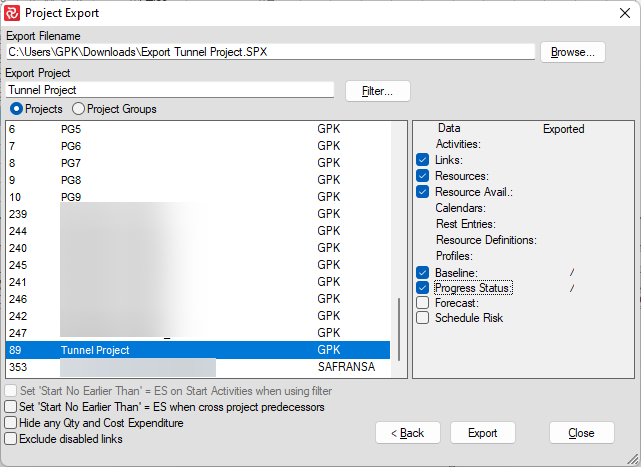
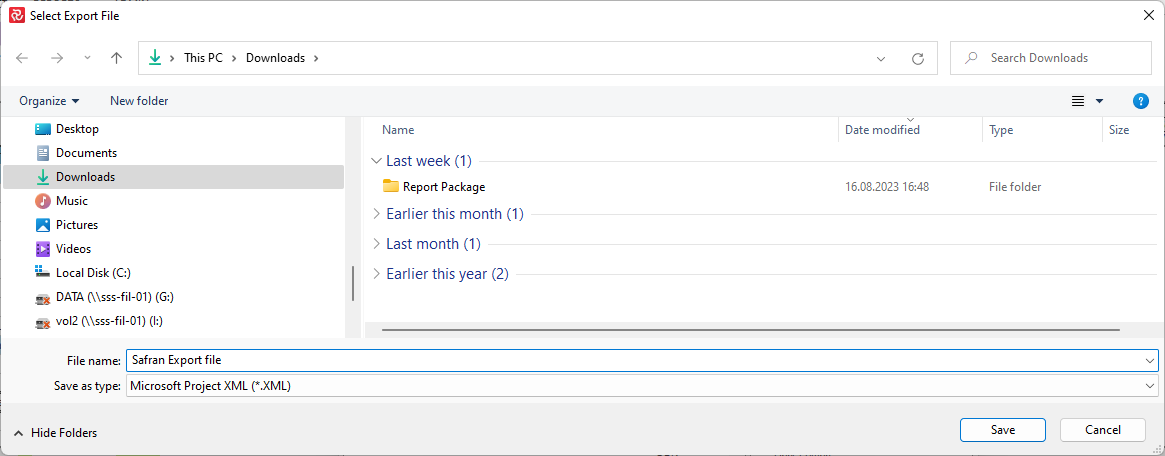
If you press the Filter button, you can select a filter or enter a filter expression if you don't want to include all activities in the export.
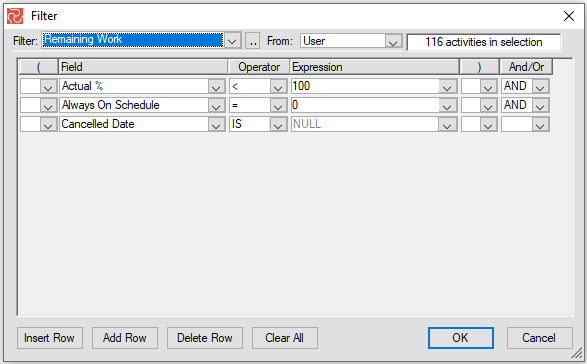
Remember to check the Baseline/Progress Status and Forecast boxes if this is relevant for your export.
If you have used a filter and not selected all activities, please remember that this would reduce the number of links exported. This, in turn, would most likely jeopardize the network logic. In such cases, we recommend you to check the 'Set Start No Earlier Than=ES on start activities when using filters' to retain the correct schedule dates.
Check the 'Set Start No Earlier Than=ES for cross-project predecessors' if your project contains links to activities in other projects.
Check 'Hide any QTY and Cost Expenditure' to exclude such numbers from the export.
Using the 'Disable links' functionality, you can exclude disabled links. This will delete any disabled links from the export file. This is especially important if exporting to older Safran Project versions does not support this field.
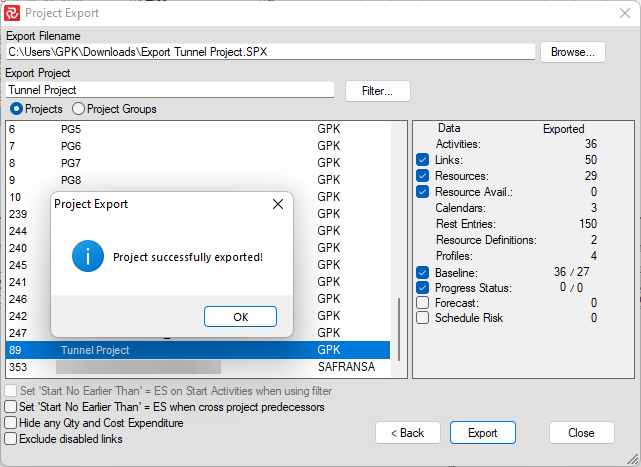
Press the Export button to generate the export file when configuring your export to suit your requirements. When the export is completed, Safran will update the export panel with the number of activities, links, resources, and so forth included in the file.
Exporting to Primavera P6
Safran Project can transfer schedule data and related information to Primavera using the XER file format.
Please remember that Safran Project is a much more comprehensive application than Primavera, containing functions for creating/storing periodic status information, Variation Orders, multiple scopes/definitions, sub-projects, and Contract Items, to mention a few.
When exporting to Primavera, Safran Project will only export data that Primavera can comprehend/make use of. This typically comprises the network, i.e., activities, links, resources, calendars, and userfields.
Before exporting your project to an XER file, it is recommended to run XER Export Checks.
The export function may be found on the File/Interface ribbon or by pressing CTRL+E.

Choose the Primavera XER file type and press Next.
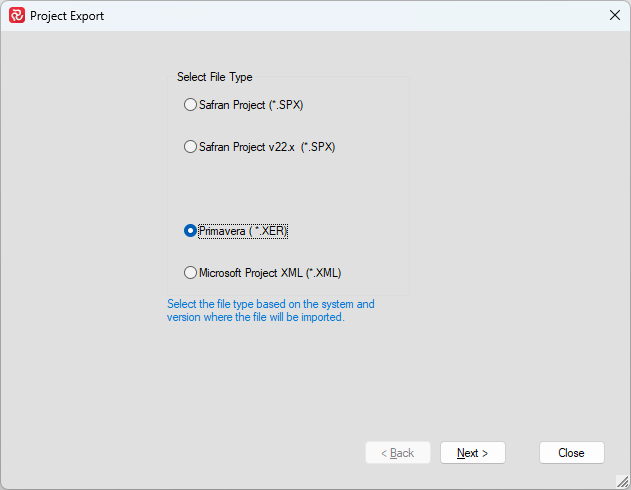
By default, Safran will highlight the project you currently have open. However, you may export any other projects by focusing on the relevant project in the Project list.
Press the Browse button to select a location and specify a file name.
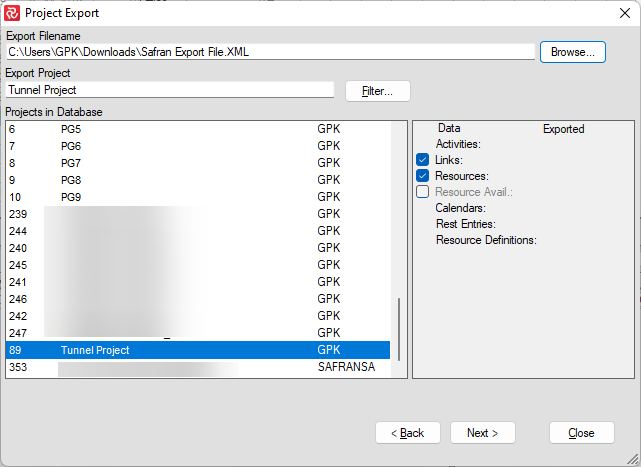
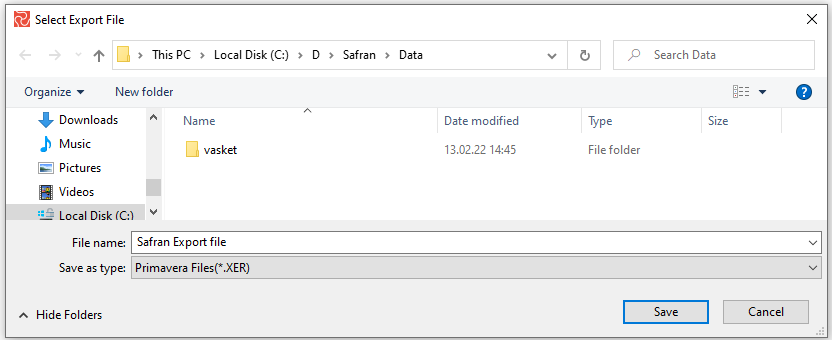
If you press the Filter button, you can add/select a filter or filter expression if you don't want to include all activities in the export.
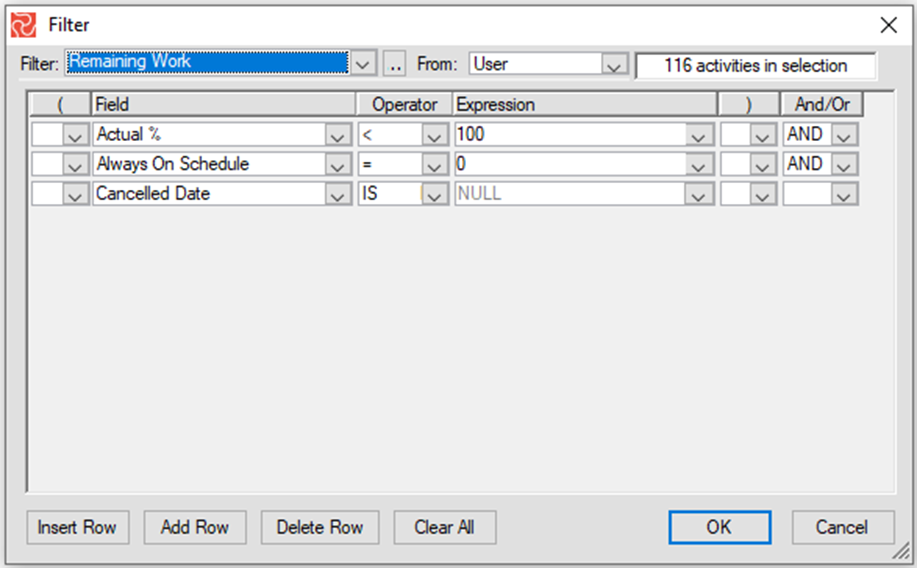
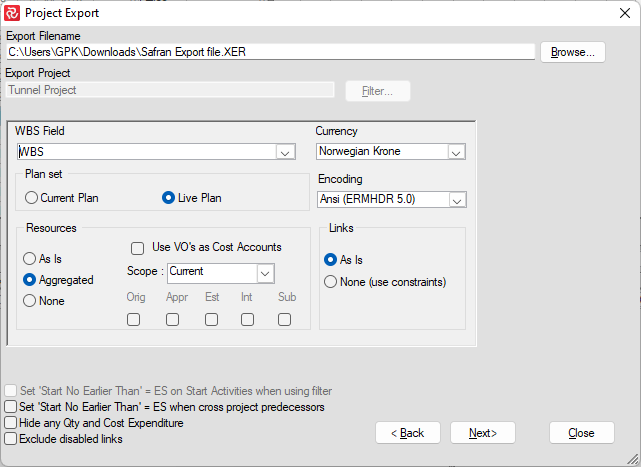
WBS field
The WBS field option is used to nominate a Safran Project userfield (Reference or Outline) Code, which will be used as the Primavera WBS structure. If no Safran Project field is chosen, a dummy structure with a single node will be introduced in the file. If a Safran Project field is used, any activities without a value for this field will be assigned to a 'dummy node' at the root level.
Currency: Choose a relevant currency from the dropdown list.
Encoding: Choose a relevant data encoding for the export. Valid encodings are ANSI/UTF 8/UTF 16.
Plan Set:
Primavera cannot deal with both plan sets simultaneously. Therefore, Safran offers the option to send either the Current or Live plan. 'Live plan' will send schedule dates (Early Start/Finish) relative to Timenow. In contrast, the 'Current plan' will send schedule dates (Current Early Start/Finish) as per the latest Cut-off date, taking into account any progress information.
Resources:
'As is' will include all resources. 'Aggregated' will summarize multiple resource entries per activity to a single resource entry and include this in the export. 'None' will not have any resource information in the export.
Using VOs as cost accounts will treat each change from the change register as a separate cost account in the export file.
Scope:
Select the Safran scope you would like to send according to your scope definition. Valid options are Baseline/Current/Total/User-defined. User-defined allows you to choose any combination of quantities of the type Original(from initial baseline)/Appr(VO)/Est/VOR/Int(Internal/Sub(Subcontracted).
Links:
'As is' will include logic links as part of the export. 'None' will not send links but will enter a Start No Earlier constraint to all activities to retain correct schedule information.
XER Export Checks
When exporting a project to Primavera P6 it is a good idea to run a ‘Health Check’ on your schedule information prior to running the export.
Even though Safran Project and Primavera P6 are both planning and scheduling systems based on the Critical Path Method, the systems do have slightly different philosophies and functionalities.
Safran Project allows you to run a quick check of your network/schedule data and provides you with a list of any issues that might cause trouble or inconsistencies in P6.
By running the check prior to exporting, you have the opportunity to correct or remove any Safran information that is not consistent with/supported by Primavera P6 to ensure that the import runs smoothly.
The XER Export Checks tool is found on Data/Interface/XER Export Checks as shown below:

By pressing the XER Health Check button, Safran opens a window providing you with an overview of potential inconsistencies when importing to P6 .
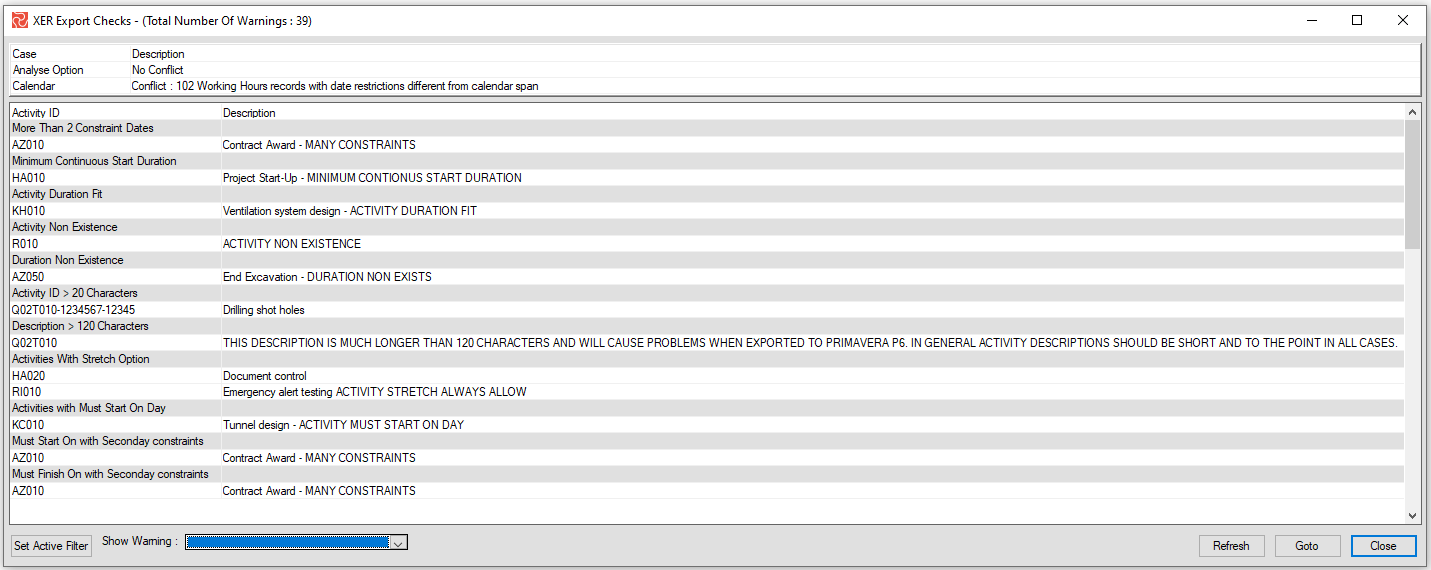
By clicking on the 'Show Warning' a list of inconsistency types for your schedule is presented. When selecting an inconsistency type, a list of activities containing that type is presented:
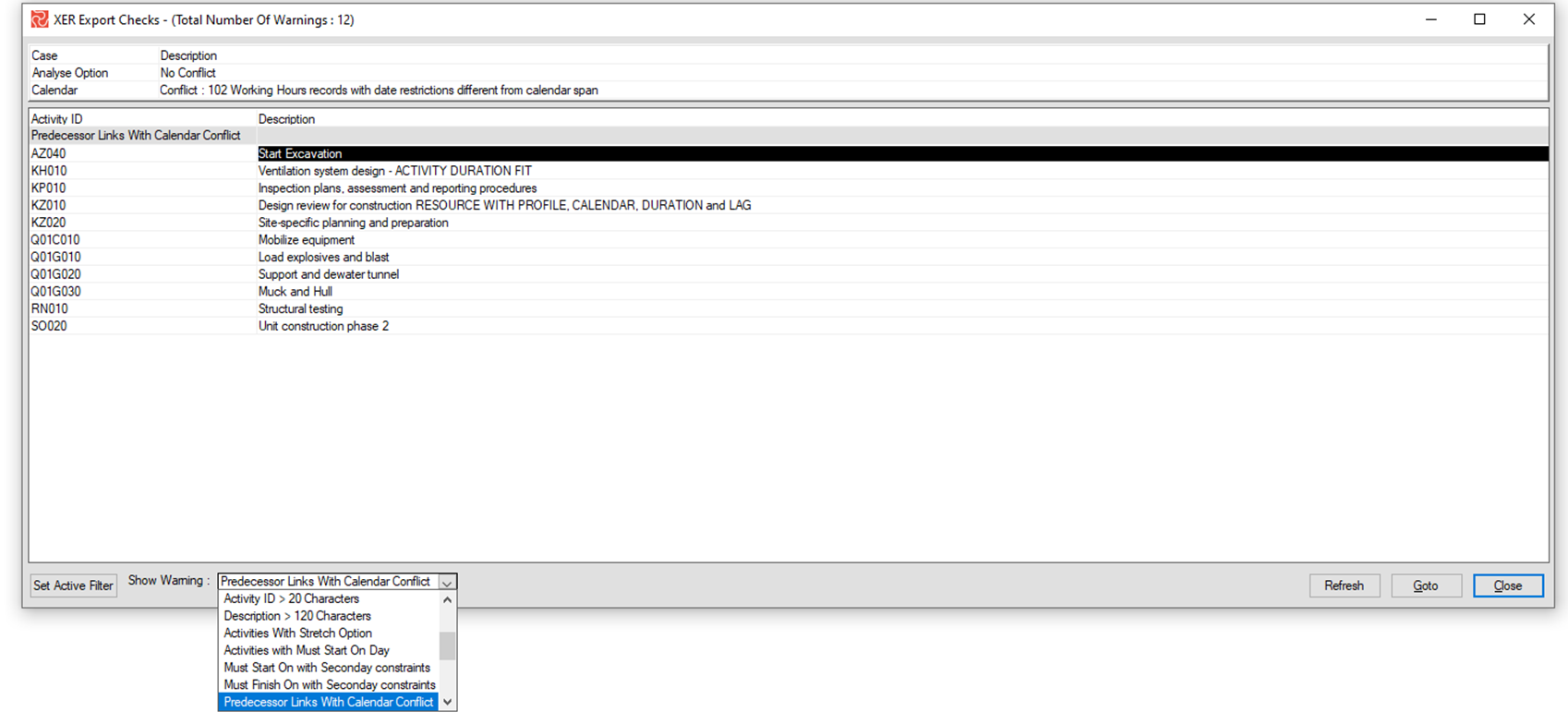
If you press the 'Set Active Filter' button after selecting an inconsistency type, Safran will use the inconsistency type as a 'filter' in the Barchart Editor and present all activities with this inconsistency, making it easier to get an overview and make any necessary corrections/amendments.
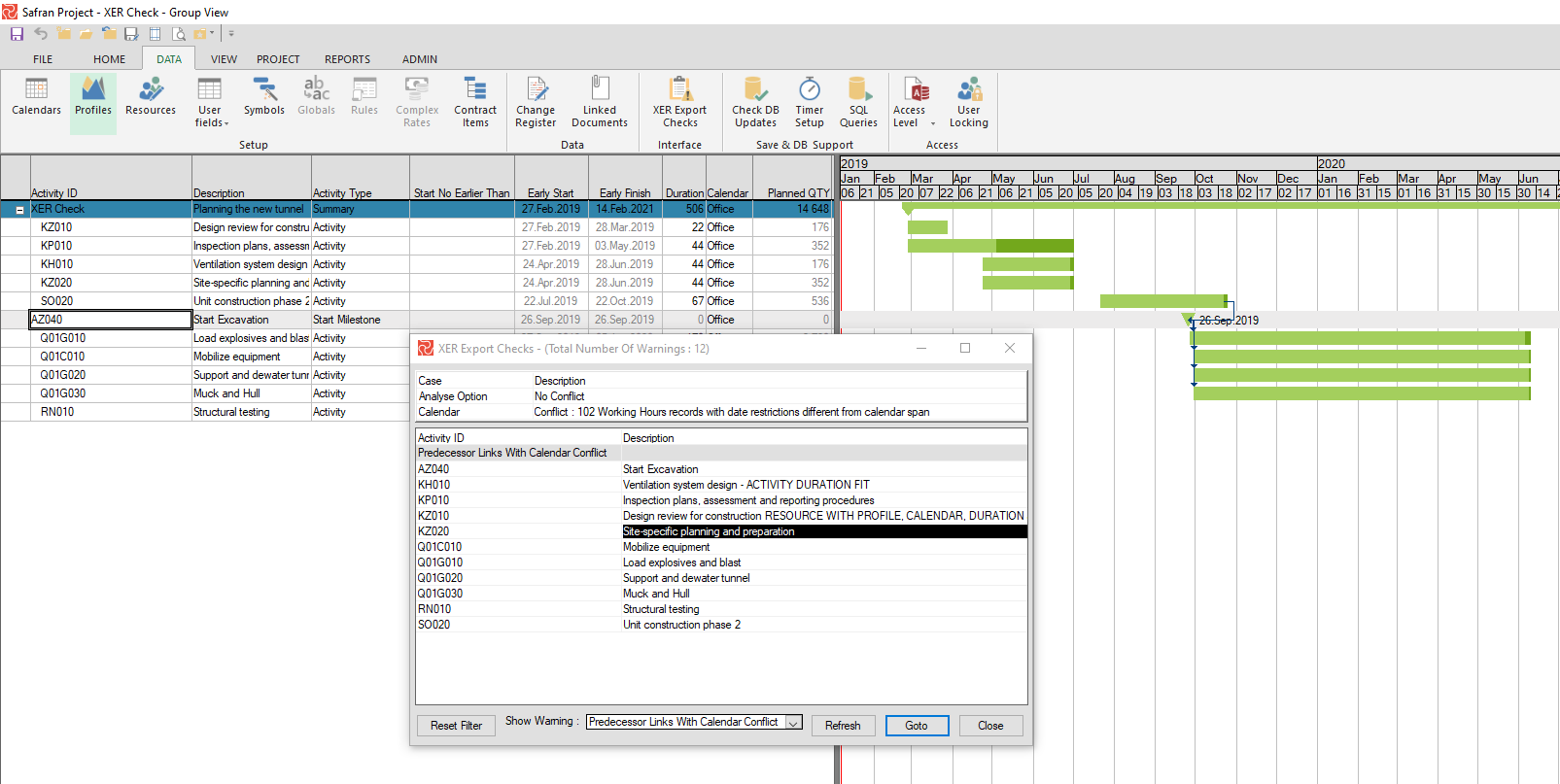
When highlighting an activity in the XER Export Checks window, you can press the 'Goto' button to jump to/focus on the relevant activity in the Barchart Editor. Double-clicking the activity will have the same effect.
As you make changes to your data and remove inconsistencies, press the 'Refresh' button to get an updated list of any remaining inconsistencies.
An overview of inconsistency checks made by Safran Project
Initially, Safran checks your Safran analysis options (Project/Properties/Schedule Options) for conflicts with the relevant Primavera options.

In short, using the default Safran 'Schedule Options' shown below should not result in conflicts.
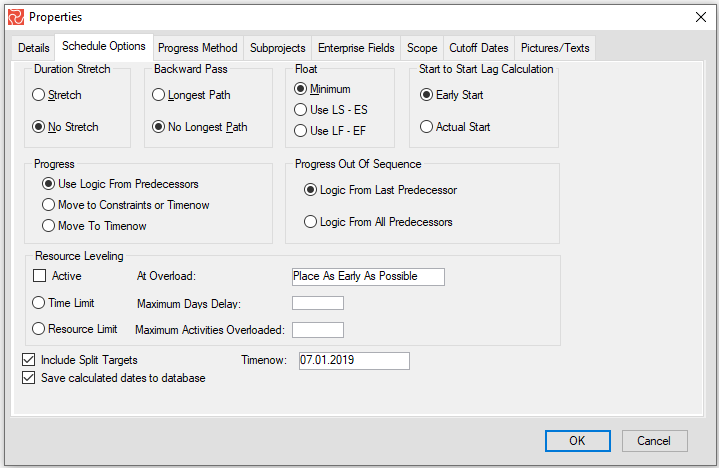
Safran then checks for calendar conflicts, as shown below:

Consider the calendar conflict error message above regarding 'Working Hours records.'
The screenshot below the 'Office' calendar contains non-working periods outside the calendar span. A number of the non-working days 'From date' is earlier than the Calendar Start date. This is not an issue for Safran. However, not aligning these before exporting to Primavera will cause errors when importing to Primavera.
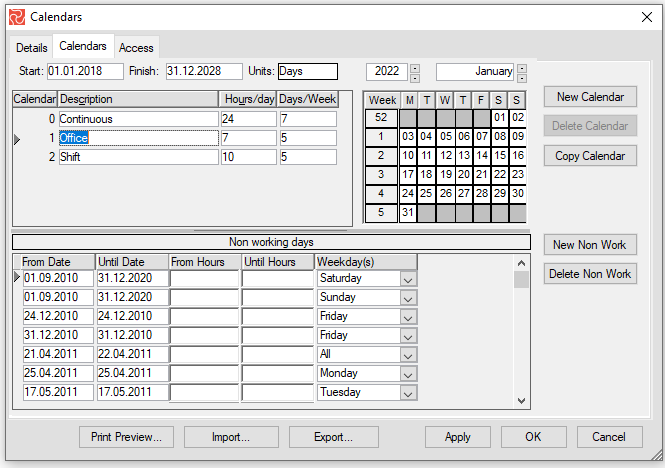
If your schedule/calendar is 'minute-based,' please be aware of the following:
- Safran Project supports three types of calendar units: Day, Hour, and Minute.
- When exporting schedules from Safran Project, calendars are transferred as minute-based calendars. However, you should be aware that even if the calendar is in units of minutes, P6 only allows periods to be specified in half hours.
- Therefore, You should ensure the minute part of your calendar rest periods is either nn:00 or nn:30.
Finally, Safran checks the following 20 activity/link/resource issues that are not supported in Primavera:
More Than 2 Constraint Dates

Safran Project allows you to use any of the six available date constraints above, while Primavera will only allow 2, a Primary and a Secondary date constraint.
Minimum Continuous Start Duration

Activity Duration Fit

Safran Project allows you to control the start date of an activity to ensure that it can start and continue within the minimum number of days/hours specified. This is not supported in Primavera.
Safran Project allows you to control the duration of an activity to expand and encompass its float (effectively setting duration = late finish - early start). Primavera does not support this.
Activity Non-Existence

Safran Project allows you to determine whether or not an activity should be considered/exist in the network analysis. This is not supported in Primavera P6.
Duration Non-Existence

Safran Project allows you to determine whether or not an activity duration (effectively retaining logic) should be considered/exist in the network analysis. This is not supported in Primavera P6.
Activity ID > 20 Characters, Description > 120 Characters

Safran Project allows an Activity ID of over 20 characters and an Activity Description of over 120 characters. The limits for Primavera P6 are 20/120, respectively.
Activities With Stretch Option

Safran Project allows activities to be stretched under certain circumstances. This is not supported in Primavera P6.
Activities With Must Start On Day

Safran Project allows you to specify a specific weekday for an activity to start on. This is not supported in Primavera P6.
Must Start On/Finish On with Secondary Constraints

Safran Project allows any number of Constraint dates to be entered. This is not supported in Primavera P6.
Predecessor Links with Calendar Conflicts

Safran has no limitations on using different calendars for activities and links. Primavera may specify link calendars for all links per preceding/succeeding activity-specific/continuous calendars.
Predecessor Links with Split Target
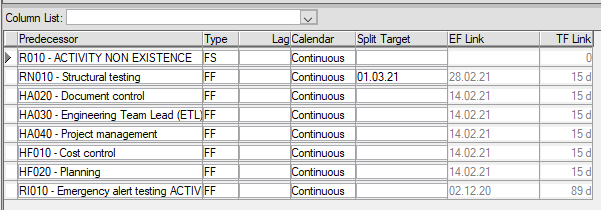
Safran Project allows you to distribute the float between two or more activities by adding a Split Target date. Primavera P6 does not support this concept.
Successor Links with Calendar Conflicts

Safran has no limitations on using different calendars for activities and links. Primavera may specify link calendars for all links per preceding/succeeding activity-specific/continuous calendars.
Successor Links with Split Target

Safran Project allows you to distribute the float between two or more activities by adding a Split Target date. Primavera P6 does not support this concept.
Disabled Links

Safran Project allows you to disable (Enabled=No) links. Primavera P6 does not support this concept.
Resources With Calendar, Duration, Lag, or Profile

Safran Project allows you to specify both Calendar and Duration that deviate from the Activity equivalents and enter a Lag or Profile for a resource. Primavera does not support these concepts.
Resources mix Total & Per Unit.

Safran Project allows you to combine Total and Per-Unit resources for an activity. Primavera does not support this.
The abovementioned checks have been implemented closely with clients who regularly export to Primavera.
Should you become aware of any other missing checks that should be included in this tool, we strongly encourage you to add an Improvement Proposal on our Safran support website.
Exporting to Microsoft Project
Safran Project lets you export projects and associated data to be read by users of Microsoft Project. This is the Microsoft Project text file format *.XML.
During the export process, you can determine what schedule data elements you want to include, e.g., activities, resources, and resource availabilities.
The export always includes the user-defined data associated with the project, such as calendar sets and calendar definitions, resource sets, etc.
You can also apply a filter to export only parts of your Schedule.
The export function may be found on the File/Interface ribbon or by pressing CTRL+E.

Choose the Microsoft Project XML file type and press Next to continue.
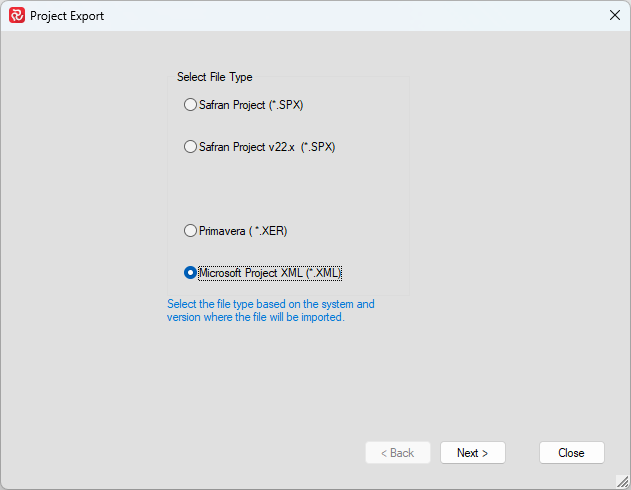
By default, Safran will highlight the project you currently have open. However, you may export any other projects by focusing on the relevant project in the Project list.
Press the Browse button to select a location and specify a file name.


If you press the Filter button, you can add/select a filter a filter expression if you don't want to include all activities in the export.

By default, all available Safran userfields will be mapped to their relevant counterpart in MS Project (i.e., Safran Text 1 to MS Project Task Text1).
However, you may re-map fields to suit your needs by dropping into the field list and changing the default.
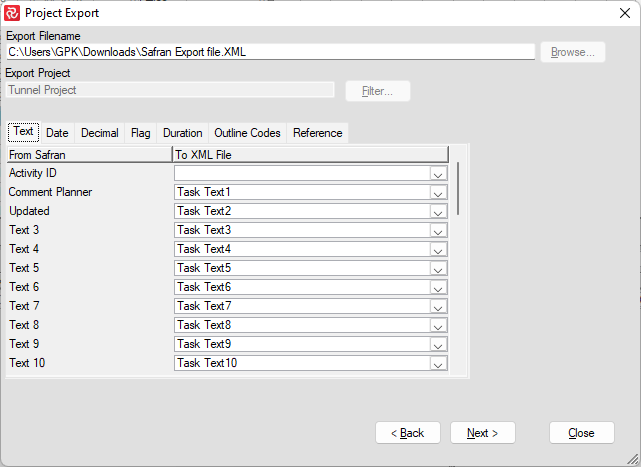
If you have used a filter and not selected all activities, please remember that this would reduce the number of links exported. This, in turn, would most likely jeopardize the network logic. In such cases, we recommend you to check the 'Set Start No Earlier Than=ES on start activities when using filters' to retain the correct schedule dates.
Check the 'Set Start No Earlier Than=ES for cross-project predecessors' if your project contains links to activities in other projects.
Check 'Hide any QTY and Cost Expenditure' to exclude such numbers from the export.
If you use the functionality 'Disable links,' you are also given the option to 'Exclude disabled links.' This will delete any disabled links from the export file. If you do not tick this option, the export will treat disabled links as enabled.
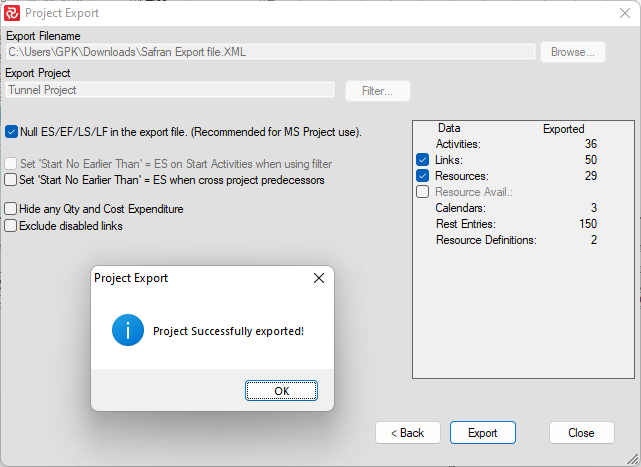
Press the Export button to generate the export file when configuring your export to suit your requirements. When the export is completed, Safran will update the export panel with the number of activities, links, resources, and so forth included in the file.